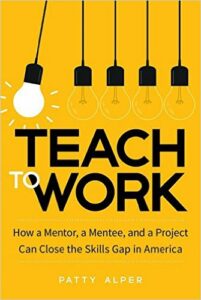The Power of Mentorship
Giving back.
There’s one aspect of servant leadership that is most important: helping people work on their lives, not just their jobs.
Becoming a mentor is one way that professionals can give back.
Patty Alper’s passion is mentoring. She is president of the Alper Portfolio Group, a marketing and consulting company, and is a board member of both the Network for Teaching Entrepreneurship (NFTE) and US2020, the White House initiative to build mentorship in STEM careers. Her new book, Teach to Work: How a Mentor, a Mentee, and a Project Can Close the Skills Gap in America, provides a compelling argument for starting mentor programs in organizations and communities around the world.
The Joy of Mentoring
Mentoring is your passion. What are a few lessons that you’ve learned from your work mentoring so many inner city high school students?
I’ve learned that the impact you can have on students can be even greater than you ever imagined. And it is wonderful. Consider this: so often these youth have absolutely no connection to successful, professional adults. When you mentor, you become their ambassador to a future world of commerce, which is often remote, complex, scary and seemingly unattainable. I have found an intergenerational connection forms particularly when you share your own life trajectory. And not the cocktail-party jargon about Mr. Success either, but more the vulnerable mishaps and the bumps and turns along the way. When you piece together life’s uncertainties with strategies that turn out well, you offer kids a truly relatable journey. It’s as if you have said, subliminally, “If I can, YOU can.”
When you enter into mentorship, you do so blindly. You enter without a return-on-investment in mind but simply a prospect for potential. This phenomenal exchange can result in an unanticipated “light bulb” moment. What I’ve learned is that you might actually set a ripple in motion. After 1500 student letters I’ve received over the course of 15 years of mentoring, I’m witness to a mentor’s impact that is unforeseen. Students, who look like they are not even listening or engaged, write to proclaim gratitude for an obscure detail you thought went unnoticed. Indeed, some mentees have stayed in touch and are young adults now— in their thirties—who have become entrepreneurs, educators, fashionistas, or preachers. Interestingly, the highest compliment of all is that they, too, are paying it forward. What I’ve learned is that you cannot forecast the genuine awe that occurs when you help another and the crescendo of that ripple effect.
What are a few of the benefits of corporate mentoring with students?
The difficulty with answering this question is keeping it to a “few.” Starting with the mentor, the benefits include the connections and friendships you make. You meet incredible, knowledge-craving students who will cherish every day that you make time for them. Also, you get to know your fellow employees, from senior management to administration, in a wholly new, shared experience of giving back. These positive experiences are brought back to the workplace and ultimately impact the culture.
Indeed, one of the benefits of offering corporate mentorship is that millennials prefer to work for a company with a robust corporate social responsibility program. Therefore, more qualified employees will seek jobs there. I believe they want to engage in good works activities that they might not be able to find or fund of their own volition. Employees feel a greater sense of loyalty to a company that isn’t solely profit driven but is a “company with a soul.”
Lastly, the employees find a unique way in which they can serve their company by sharing their professional knowledge as ambassadors in the community. Will those mentees go home and tell their parents about you and the company you work for? You bet. Will the school remember the corporation when it comes time to send their finest students for potential employment? Absolutely. And will an employee find like-minded people within the corporation who will all want to build on the mentoring connection you have? Almost immediately.
Watch Your Employees Benefit from Mentoring
You talk about the link between employee retention and mentoring. Would you share your perspective?
As Rick Luftglass, former director of The Pfizer Foundation’s education volunteer programs, said when I interviewed him for the book, “Employees want to be part of something that is bigger than a company. The business culture is internally based, but the philanthropy is external. That volunteer ethos provides something more than a quarterly return on earnings…it stretches employees beyond their day-to-day job. “
Mentoring boosts employee retention in a myriad of ways. The employees who mentor become the public face of their company. They take pride in this important role of bridging corporate relationships within the communities where they reside. As well, they enjoy an enriched experience that is brought back to the business culture. A sense of gratitude and loyalty evolves toward the company that provided this opportunity. All of these factors lead to greater employee happiness, more significant social connections, and greater satisfaction with the company overall.
Build a Successful Mentorship Program
What tips would you share to build and sustain a successful mentorship program?
 One of the most important aspects of a successful mentorship program is making sure the mentor is adequately prepared for what he or she may experience. Rather than “trial by fire,” the best way to keep mentors engaged and build a successful program is to not only provide some sort of training from more experienced mentors (of course, reading my book is extremely helpful) but also providing an environment where the mentors can ask questions.
One of the most important aspects of a successful mentorship program is making sure the mentor is adequately prepared for what he or she may experience. Rather than “trial by fire,” the best way to keep mentors engaged and build a successful program is to not only provide some sort of training from more experienced mentors (of course, reading my book is extremely helpful) but also providing an environment where the mentors can ask questions.
As spelled out in the book, the concepts of “Project Based Mentoring™” include defining a job role for the mentor that easily fits within their wheel house of knowledge. Indeed, the project becomes the catalyst in an intergenerational relationship, and there is a clear reason to come together. This dynamic often leads toward more successful mentor-mentee outcomes. As well, the mentor needs to make a commitment to this process.
Successful mentoring also incorporates ongoing feedback. A coordinating entity needs to have periodic touchpoints to learn how the mentor is doing. Lastly, having a chain of acknowledgement and gratitude established is essential. As I mentioned earlier, we have students write year-end letters to express their takeaways, their future plans, their lessons learned. An organization might host a year-end meeting with breakouts for mentors to share best practices as well as public gratitude expressed for time invested. The mentor experience is well-rounded when it provides adequate training and a defined role, as well as encourages growth, feedback and acknowledgement.
Do you believe everyone can be a good mentor? What are the qualities of an excellent mentor?
I believe that America has a treasure trove of experienced practitioners: whether it’s attorneys, accountants, engineers, entrepreneurs, IT specialists, graphic artists, scientists, civil servants or mid-level managers…. Anyone can share their passion and their know-how with a student who is interested in a similar subject. I believe that with adequate training and a defined framework to work within, mentorship can multiply and immediately benefit America’s youth to better prepare them for the workforce.
I have seen, first hand, the most prominent lawyers and CEO’s ask, “How do I work with kids?” “What do I have to offer?” I understand the hesitancy and the caution. But step into class, sit one-on-one with a student with a question, and all the fear flies out the window.
Yes, sometimes, mentoring will be challenging. It requires training, patience, empathy, and an ability to listen without judgement. For example, does your mentee have a hard time focusing? There are suggested ways to work through that – a mentor needs to keep a calm head and a focus on ways to meet the mentee at his or her level. And the mentor needs to learn how to listen. It is often tempting to keep talking through uncomfortable moments. But some of the greatest breakthroughs happen when mentors stop talking and ask mentees to share an idea. And what’s even more interesting is mentors will often see that they can apply what they learn from mentoring to relationships they have at the workplace and with clients.
An excellent mentor keeps a cool head and listens as much as he or she talks. It is surprising how much these kids think about the topic at hand and the mentor’s suggestions. And when you ask them to engage, you’ve accomplished a dialogue rather than a lecture.
Change Yourself
How has mentoring others changed you?
This is a daunting question that requires a great deal of self-reflection. I would say I need to answer this on two levels, privately and publicly.
From the vantage of my own internal value system, I believe mentoring opened my heart to difference and to our future generations. We so often get absorbed in circles of homogeneity – discussing things with colleagues who are similarly aged, with similar backgrounds. When you mentor, you have opportunities to get surprised – pleasantly surprised – by the brilliant words that come out of a 20-year-old’s mouth. You learn what matters to these younger generations. And you learn about the challenges they face that you simply had no idea even existed. I believe I have a greater sense of purpose and internal resolve, as I know I’m filling an important need for another…I’ve exposed them to a new possibility, idea, or pathway that could change their trajectory. All of this creates an immediate joy—I swear, I never leave class when I don’t say, “that was a high”….
On the more public side, I have loved bringing others to this experience and observing them become teachers and sharers. As I have quoted Eric Lui from his book, Guiding Lights, “We are all teachers. It is the core of humanity. It is what life is all about, passing it on…we teach to articulate for ourselves what matters. We teach to be sure that we have not lived in vain. We teach to learn.”
Ultimately, I’m proud of this work—I believe I’ve grown to be a better, more fulfilled person and a more empathetic and a more patient person. That can’t be all bad…right?

